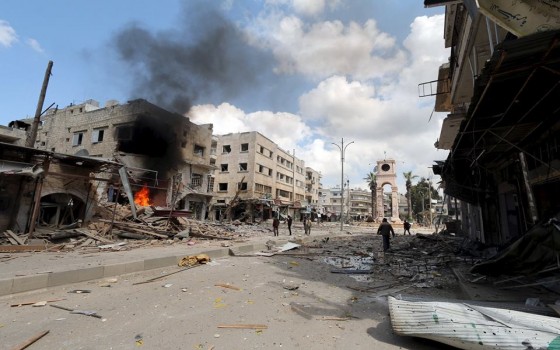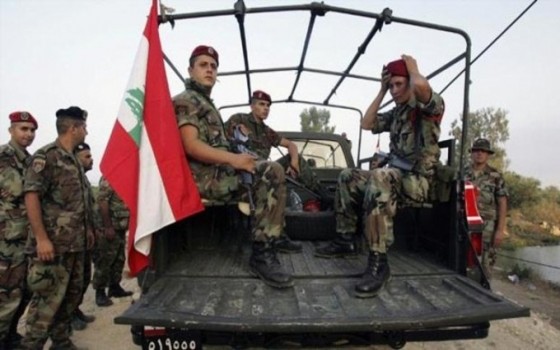
UN Secretary-General warns on the situation in the Middle East: Take irreversible steps towards implementing the two-state solution. Do not allow extremists on any side to undermine what remains of the peace process.

- Europe and Arabs
- Wednesday , 30 April 2025 8:1 AM GMT
New York: Europe and the Arabs
UN Secretary-General António Guterres said that the two-state solution – Palestine and Israel – is in danger of fading into oblivion, and that political commitment to this long-term goal is more distant than ever. According to the UN Daily News bulletin on Wednesday morning, the Secretary-General's remarks came during a ministerial meeting of the UN Security Council on the situation in the Middle East, including the Palestinian issue. The meeting was chaired by the Foreign Minister of France, whose country holds the rotating presidency of the Council this month.
Secretary-General Guterres said that the Middle East is undergoing fundamental transformations, marked by violence and volatility, but also by opportunity and potential. He stated that people across the Middle East are demanding the better future they deserve, rather than endless conflict and suffering.
He emphasized the need to work collectively to ensure that this turbulent and transitional period meets their aspirations – and achieves justice, dignity, rights, security, and lasting peace.
He said that this begins with recognizing two fundamental truths: First, that the region stands at a crossroads in history. Second, true and sustainable peace in the Middle East hinges on a fundamental issue that the Security Council has repeatedly emphasized for decades: a two-state solution between Israel and Palestine, living side by side in peace and security, with Jerusalem as the capital of both states.
The Secretary-General warned that the two-state solution is approaching a point of no return. He said that the rights of both Israelis and Palestinians to live in peace and security have been undermined—and the legitimate national aspirations of Palestinians have been denied—while they endure Israel's continued presence, which the International Court of Justice has ruled illegal.
The Secretary-General added: "The world cannot stand idly by and watch the two-state solution disappear. Political leaders face clear choices: silence, acquiescence, or action."
A clear and urgent appeal to Member States
The Secretary-General made a clear and urgent appeal to Member States: "Take irreversible action towards implementing the two-state solution. Do not allow extremists on any side to undermine what remains of the peace process." The Secretary-General explained that the high-level conference (on the two-state solution), to be held next June, co-chaired by France and Saudi Arabia, is an important opportunity to revitalize international support.
He urged Member States to think creatively about the concrete steps they will take to support a viable two-state solution before it is too late.
Gaza and the West Bank
Since the horrific terrorist attacks launched by Hamas on October 7, the situation has worsened on all fronts, according to the Secretary-General, warning that there appears to be no end in sight to the killing and misery in Gaza.
Guterres said the ceasefire had brought a glimmer of hope – the long-awaited release of hostages and the delivery of life-saving humanitarian relief.
But he said those opportunities faded with the collapse of the ceasefire on March 18. “Since then, nearly 2,000 Palestinians in Gaza have been killed by Israeli airstrikes and military operations – including women, children, journalists, and humanitarian workers.”
Aid is non-negotiable
The Secretary-General said that the humanitarian situation in the Gaza Strip “has gone from bad to worse, to unimaginable,” noting that Israel, for nearly two months, has blocked the entry of food, fuel, medicine, and commercial supplies, depriving more than two million people of life-saving relief. “All this while the world watches.”
He expressed concern about statements made by Israeli government officials regarding the use of humanitarian aid as a tool for military pressure. He emphasized that “aid is non-negotiable.”
In the occupied West Bank, including East Jerusalem, the Secretary-General said that Israeli military operations, the use of heavy weapons in residential areas, forced displacement, demolitions, movement restrictions, and settlement expansion are significantly altering demographic and geographic realities.
Advisory Opinion
The Secretary-General also addressed the advisory proceedings currently underway at the International Court of Justice regarding Israel’s obligations, as an occupying Power and a Member of the United Nations, with regard to the presence and activities of the United Nations in and related to the occupied Palestinian territory. He said that the UN Legal Counsel had submitted a written statement to the Court on his behalf in February and delivered an oral statement before the Court on Monday.
He said that the statement included points he had raised on several occasions. Specifically, he stressed the need for all parties to the conflict to comply with all their obligations under international law, including international human rights law and international humanitarian law.
He explained that Israel, as an occupying power, is obligated to ensure the provision of food and medical supplies to the population and to respect and protect humanitarian and medical personnel and the United Nations.
He emphasized the obligation under international law to respect the privileges and immunities of the United Nations and its personnel, including the absolute inviolability of UN premises, property, and assets—and immunity from UN legal process. He said that this immunity applies to all UN entities in the occupied Palestinian territory—including UNRWA.
Lebanon and Syria
Regarding Lebanon, the Secretary-General stressed the need to respect the ceasefire and territorial integrity and implement all obligations. In Syria, Guterres stressed the importance of continuing to work to support the country's path toward a political transition that includes all segments of the Syrian people - "a transition that ensures accountability, promotes national reconciliation, and lays the foundation for Syria's long-term recovery and enhanced integration into the international community."












No Comments Found